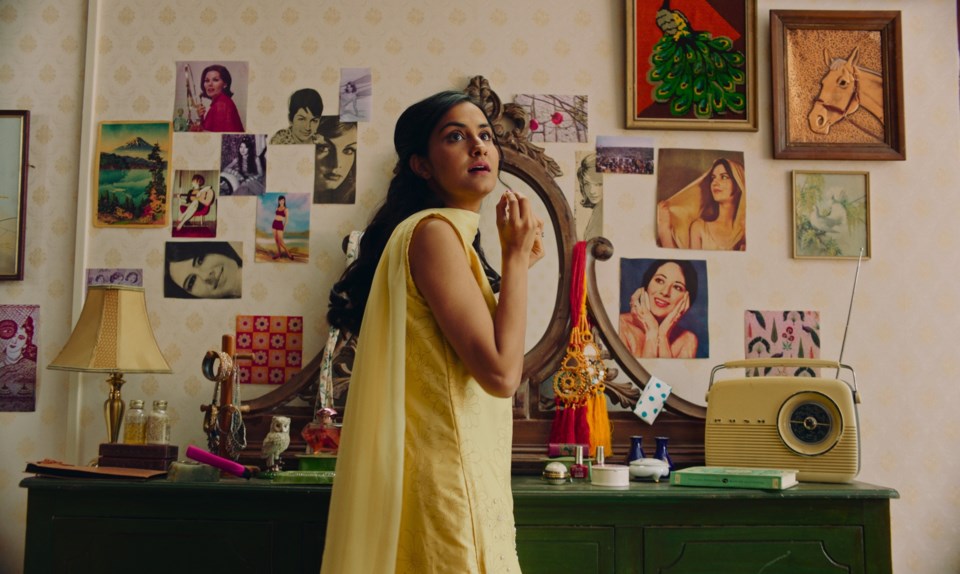Growing up in rural Nova Scotia in the ŌĆÖ90s, Fawzia Mirza says she connected with her Pakistani heritage by watching Bollywood movies.
But with few Hindi films exploring romance between LGBTQ+ characters, she couldnŌĆÖt fully identify with the love she saw on screen.
ŌĆ£I was really struggling with whether I could be queer and Muslim and still love Bollywood romance,ŌĆØ Mirza said in a virtual call from Chicago, where she was directing an episode of Disney Plus' upcoming comedy ŌĆ£Deli Boys.ŌĆØ
ŌĆ£Watching these films, I wanted that kind of all-consuming love. I wanted to be swept off my feet. And if those stories aren't being made in a way that is inclusive of you, then you have to reimagine them.ŌĆØ
Mirza says that was the impetus for her first short film, ŌĆ£The Queen of My Dreams,ŌĆØ released in 2012, which reimagined 1969 Bollywood classic ŌĆ£AradhanaŌĆØ in a queer light.┬Ā
ŌĆ£Through making that film, I really found that yes, I can be all of those identities. But also, making art really saved my life.ŌĆØ
She says the film also played a role in her publicly acknowledging her queer identity.
ŌĆ£Showing the film at festivals really helped me come out and really helped me see the power of art and the impact, not only that it could have on me, but on other people.ŌĆØ
Twelve years later, the writer-director has expanded ŌĆ£The Queen of My DreamsŌĆØ from a short film to a theatrical play to her debut feature, hitting theatres across sa╣·╝╩┤½├Į on Friday.┬Ā
Markham, Ont.'s Amrit Kaur of CraveŌĆÖs ŌĆ£Sex Lives of College GirlsŌĆØ stars as Azra, a queer Muslim grad student who flies to Pakistan after the sudden death of her father Hassan, played by Ottawa-bred Hamza Haq of CTVŌĆÖs ŌĆ£Transplant.ŌĆØ┬Ā
Once there, she and her religiously conservative mother Mariam, played by Nimra Bucha of Disney PlusŌĆÖ ŌĆ£Ms. Marvel,ŌĆØ are forced to face their strained relationship head-on.┬Ā
The filmŌĆÖs mother-daughter dynamic closely mirrors MirzaŌĆÖs own.
ŌĆ£I do come from a conservative family, and it was a challenge,ŌĆØ she says.
Her 2015 play ŌĆ£Me, My Mom and Sharmila,ŌĆØ which ŌĆ£The Queen of My DreamsŌĆØ is adapted from, tells the story of how she came out to her mother.
ŌĆ£I was really trying to reconcile, at that point, my own understanding of who I am, and my relationship with my family and mother. I think at the heart of all my work is the question, ŌĆśHow do we become who we are?ŌĆÖŌĆØ
Mirza structures ŌĆ£The Queen of My DreamsŌĆØ as two coming-of-age tales unfolding across three decades.┬Ā
The story begins in 1999, when Azra and Mariam grapple with their differences. Interspersed are glimpses into Azra's upbringing in Nova Scotia, starting from her family's arrival in 1989. The narrative also delves into 22-year-old Mariam's life in Karachi in 1969, when she contends with her own domineering mother.
"It's a mother-daughter story but it's also a love letter to mothers," says Mirza.
"It's a story about love and compassion, and that to understand yourself, you have to look to the past."
Taking cues from ŌĆ£Aradhana,ŌĆØ which uses one actor to portray a father and son during specific ages, Kaur doubles up as Azra in 1999 and the younger version of her mother.┬Ā
Several daydream passages see both Azra and Miriam imagine themselves as protagonists in Bollywood films.┬Ā
ŌĆ£I would argue the genre of Bollywood is quite queer, just in the fact that its form is so big and so dreamy and so not just one thing,ŌĆØ says Mirza.
She adds that by recontextualizing Hindi films with LGBTQ heroes, ŌĆ£we see that we can have that magical Bollywood fairy tale romance no matter who we are, no matter who we love.ŌĆØ
Mirza says all of her projects come from a deeply personal place.┬Ā
ŌĆ£My process of finding myself and finding self-love was the process of making movies over the years. People go to therapy. I think making movies has been a form of that for me.ŌĆØ
SheŌĆÖs planning a feature called ŌĆ£Heirloom,ŌĆØ about a woman who enlists her queer friends to help her steal a cherished family jewelry piece from her mother, who adamantly refuses to pass it down for her wedding.┬Ā
ŌĆ£ItŌĆÖs a heist film-meets-ŌĆśBridesmaidsŌĆÖ kind of vibe.ŌĆØ┬Ā
This report by The Canadian Press was first published March 20, 2024.
Alex Nino Gheciu, The Canadian Press



